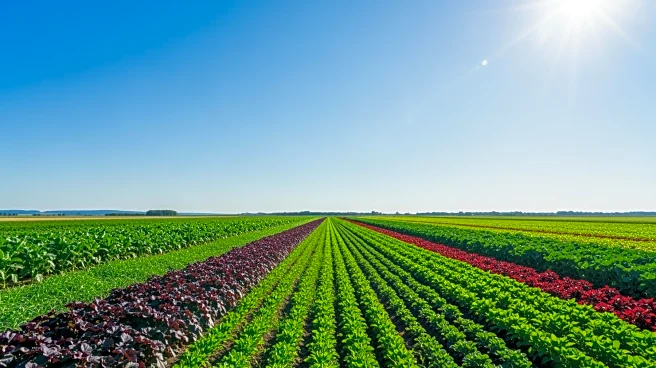What's Happening?
President Mary Robinson has emphasized the critical role of smallholder farmers in global food security at the upcoming COP30 climate conference. Despite managing only 12% of the world's farmland, these farmers produce a third of the world's food and nearly
70% of Africa's. However, they face severe impacts from climate change, receiving less than 1% of climate finance. Robinson argues that the collapse of smallholder farms would have catastrophic global consequences, exacerbating hunger and destabilizing societies. She highlights the need for increased investment in adaptation measures, which are often overlooked in climate responses. Robinson calls for wealthy nations to fulfill their $100 billion annual adaptation pledge made in 2009, stressing that adaptation is both a necessity and an opportunity for innovation.
Why It's Important?
The focus on smallholder farmers at COP30 is significant as it addresses a critical gap in climate finance and adaptation strategies. These farmers are vital to global food security, yet they are disproportionately affected by climate change. By investing in their resilience, there is potential to enhance food security, reduce poverty, and conserve biodiversity. The economic impact could be substantial, with estimates suggesting that proper investment could add $1 trillion to the global economy. Furthermore, empowering female farmers, who are often depicted as victims rather than agricultural experts, could lead to transformative changes in local economies and communities.
What's Next?
As COP30 convenes in Brazil, agriculture is expected to be a central topic, with discussions on transforming food systems. The conference will likely see debates over adaptation finance access and obligations. Robinson urges leaders to make ambitious commitments to adaptation and ensure that climate finance reaches those already driving resilience in their fields. The success of the Baku to Belém Roadmap depends on mobilizing resources and channeling them effectively to smallholder farmers. This approach is not only a moral imperative but also a strategic investment in global food security and economic stability.
Beyond the Headlines
The narrative around smallholder farmers, particularly women, needs to shift from one of victimhood to one of empowerment and expertise. By recognizing their contributions and providing them with the necessary resources, smallholder farmers can drive innovation and resilience in agriculture. This shift could lead to long-term cultural and economic changes, fostering environments where sustainable practices and gender-balanced leadership thrive. The potential for smallholder farmers to contribute to climate mitigation and adaptation is immense, and their inclusion in climate finance strategies is crucial for achieving global sustainability goals.















